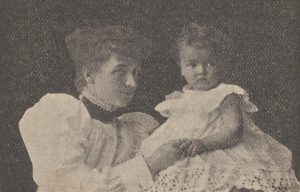[Editor: This article about Ethel Turner was published in The Bookfellow (Sydney, NSW), 25 March 1899.]
An Australian authoress.

It was when she wrote her “Children’s Page” in the Illustrated Sydney News that Ethel Turner’s real literary life commenced; and when the News died the fanciful, conversational commentary on little people’s ways was transferred to Sydney Town and Country Journal, where it is still continued over the signature of “Dame Durden.” In 1894 “Seven Little Australians” was published by Ward, Lock, and Bowden, Ltd., and since then the busy pen has never rested. We have recently heard much of the troubles which spring from “pursuing literature in Australia”; but the quiet persistence of the small figure at the desk in the Red Road Country, writing and destroying, destroying and writing again, perfecting style and art, and winning at last a well-deserved success, holds a lesson for many an ambitious author who refuses to learn that the second-best of genius, the best of talent, is the capacity for taking pains.
And Ethel Turner has kept on as well as she began. An approximate list of her books and their sales reads —
The Family at Misrule, 1895, four editions
The Story of a Baby, 1895, two editions ..
The Little Duchess, 1896, two editions ..
The Little Larrikin, 1896, three editions ..
Miss Bobbie, 1807, two editions .. ..
The Camp at Wandinong, 1898, one edition
.. ..
.. ..
.. ..
.. ..
.. ..
.. ..
15,000
10,000
6,000
16,000
16,000
12,000
A total of 115,000 copies of the books conceived in one brain, written by one pen, sold in five years: this is the real pursuit of literature in Australia — and the attainment. Nor is there a quality-cavil to insinuate; for the books which have sold best, though not pretending to the high plane of intellectual or imaginative achievement, are among the few charming stories written for and about children: in their class can one name better?
Ethel Turner was fortunate in her choice of publishers; she is a good woman-of-business; and she does not rest on her laurels or her income. This year’s book, “Three Little Maids,” is being printed for Christmas publication; next year’s book is being written; — “I find it no trouble to write a book a year — one of my books, that is,” the author confesses apologetically. “Some days indeed, the pen will not write: you sit down and make sketches on the blotting-paper. But as a rule I go to my room about ten o’clock, and by noon or so I have done my day’s work. So many days’ work to a chapter; so many chapters to a book — a regular literary arithmetic.”
Latterly the arithmetic has not been quite so easy; for a small daughter, with a pronounced taste for scribbling, has intercepted the methodical dip in the ink-bottle. Nearly three years ago Ethel Turner married Mr. H. R. Curlewis, a Sydney barrister and old-time contributor to The Parthenon; and it is thus that Kerry and Co. have been enabled to make for The Bookfellow the pleasant photograph of mother and daughter printed on the opposite page.
“Charming stories written for and about children” — there is hardly necessity to define Ethel Turner’s work farther. Even her books more especially designed for older readers might be included in the same definition. For though her charm never leaves her, it is only her childish characters who are fully realised — made lifelike, genuine, convincing. Ethel Turner’s “grown-ups” are still childish characters — have some quaint air of delightful boys and girls masquerading in their elders’ clothes. She has the key of the children’s paradise only. That is enough; but there is one person in the world who demands more, and her name is Ethel Turner. “I am so tired of writing children’s books,” she says; “I do wish to write a big book.” So she is trying.
This notice is fortunate in closing with some of Ethel Turner’s too-rarely-written “ Child Verses,” given for The Bookfellow.
Source:
The Bookfellow (Sydney, NSW), 25 March 1899, pp. 23-25
Editor’s notes:
The poem by Ethel Turner appended to the end of this article has been placed in a separate post: “A Trembling Star”.
Leave a Reply